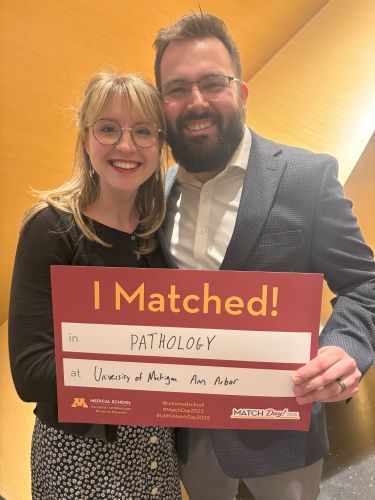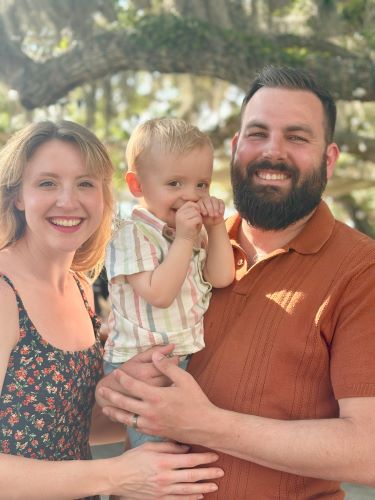

"I began considering the skills that will be important in the future and realized that pathologists are the ones who will need to be at the forefront of understanding how tissue-engineered organs are constructed and how to evaluate them."

I am originally from Indiana, but my family moved around quite a bit in the Midwest and the South. After high school, I went to Michigan Tech to study biomedical engineering. One of the big draws was that students could get involved in research right away. Within the first two months, I was working in a tissue engineering lab, and I kept working there for all five years I was in school.
I also had the chance to work in industry through co-ops, which are like extended internships. I spent time at Kimberly-Clark, designing products for their Huggies diaper line and in their medical device business. Between that and my research experience, I started developing a strong interest in a research career.
 What motivated you to pursue medicine?
What motivated you to pursue medicine?
By the end of undergrad, I was trying to figure out what came next. I had worked in a lab, spent time in industry, and had even done a little teaching. As I was starting my senior year, I learned about the MD/PhD path and it just made sense. I saw the medical training as integral to my engineering research. I worried that if I did not pair an MD with a PhD, I would miss out on seeing patients directly and gaining that deeper understanding of the problems they and their doctors are facing.
I went to the University of Minnesota for both degrees. I did two years of medical school, then five years of a PhD in tissue engineering and 3D bioprinting, then finished my final two years of medical school. I found that I really enjoyed the medical side of things. It was rewarding to help patients feel like they had someone to help guide them through difficult times.
How did you decide on pathology?
At first, I thought surgery might be the right choice. I figured that if I was going to be making organs, I would need to know how to put them into people. I also considered internal medicine with a focus on post-transplant care. However, at this point, tissue engineering was not developed enough as a field for those options to make sense.
I began considering the skills that will be important in the future and realized that pathologists are the ones who will need to be at the forefront of understanding how tissue-engineered organs are constructed and how to evaluate them. My PhD advisor encouraged me to explore the specialty. Once I did a few rotations, I realized I really liked the people, the process, and the problem-solving aspects. I have enjoyed everything about pathology so far, both anatomic and clinical. Anatomic pathology will be important to my future research, and I really enjoy the whole process. Clinical pathology has its own appeal to me because it is very systems-focused, with an emphasis on quality control and process improvement that connects back to my engineering background.
 Why Michigan?
Why Michigan?
When I asked my clinical mentors for recommendations, Michigan came up right away. I liked that it is a large academic center with every fellowship option I could want, and I was glad to see active collaborations between pathology and engineering. There is an impressive group of faculty and trainees, and I knew that training here would provide the solid foundation I wanted as I began my career.
My wife is from Rochester Hills, so moving here brought us closer to her family. I had never been to Ann Arbor before applying, but people spoke highly of it. Now we live in Canton, and my commute is about 30 minutes through forests and farmland, which is a nice way to start and end the day.
What has stood out to you in residency so far?
I haven't been here very long, but orientation stood out. Everyone was approachable, from attendings to senior residents. The chiefs had everything organized and running smoothly. The facilities are also impressive. We have bright, clean labs with large windows, and even the basement labs are pleasant. There is plenty of space, natural light, and all the tools we need. It makes a big difference when you spend most of your day indoors.
What do you enjoy most about your work?
In pathology, I really enjoy catching subtle things that could easily be missed. Our job is to work through complex data and provide interpretations that are grounded in a firm understanding of the clinical context. Having the freedom to dive deep into cases to make sure we are being as accurate and precise as possible makes pathology a really unique and rewarding way to provide care to patients.
Are there any mentors you would like to highlight?
I have had so many outstanding mentors, but there are two in particular who helped me get to this point. My undergraduate research advisor, Dr. Feng Zhao, had just started her lab at Michigan Tech when I joined. She gave me a lot of independence, which shaped the way I approach science. We were very productive, and I developed a solid foundation in how to approach engineering problems while learning from her.
My PhD advisor, Dr. Angela Panoskaltsis-Mortari, taught me persistence and big-picture thinking. Midway through my PhD, we realized our original approach was not going to work and had to start over. That was nerve-wracking, but we ended up inventing a new way to create long muscle-cell fibers and incorporate them into bioprinted tissues. That work led to patents and new research directions. None of it would have happened without her support.
 How do you balance work and life?
How do you balance work and life?
It is something I am always working on. I have learned to respect my limits and prioritize things like sleep and health. In a job like this, where clear thinking counts, being well rested really matters.
Outside of work, my biggest joy is my family, which is my wife Nina and our two-year-old son, Avery. Right now, I am enjoying watching Avery's personality develop and seeing little glimpses of who he might become. Since becoming a parent, I have been more intentional about family time. Avery changes every day, and I do not want to miss that. It helps that several of my co-residents also have young kids, so there is a lot of mutual understanding and support.
What advice would you give medical students considering a career in pathology?
Get as much exposure to pathology as you can. It is not always well represented in medical school unless you make it a priority. If you are unsure whether seeing patients every day is important to you, try comparing a family medicine rotation with a pathology rotation to see which you prefer. If your school does not offer many pathology electives, consider doing away rotations.
What are some fun facts about you that we could share?
When we lived in Minneapolis, we had to take down a tree, so I had it milled into slabs and lugged about 1000 pounds of it to Michigan. I plan to turn it into heirloom furniture, starting with a dining table.
Welcome to Michigan, Caleb! We look forward to watching you develop and grow into the future. Please stop and introduce yourself to Caleb if you see him.